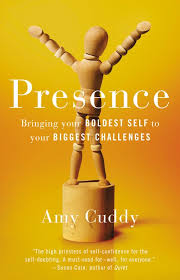
Confidence is open and invites feedback you’re willing to be vulnerable.
Confidence versus arrogance – Cuddy discusses the distinction in a conversation with Adam Grant and Susan Cain. Put family pictures high so you have to look up to see them. Set up your office so you need to reach to grab things you need. Sit up straight at your desk, arms on your chair arms. Arrange your environment to encourage expansive postures – In this video interview with Susan Cain, Cuddy suggests these tips to set yourself up for more positive postural feedback:. We are missing out on moments of love because we’re looking for this ridiculous sort of Hollywood concept of love, but it’s just one tiny part of love. Presence is contagious and mutually reinforcing. Instead of focusing on a task that makes you nervous, focus on who you actually are. The question that guided her research on body language was: Since the mind can influence the body and how you feel, your sense of confidence and how you show up in the world, is the reverse also true? Can the body influence the mind when a person is feeling powerless? To Understand Cuddy’s Work, Start HereĪmy Cuddy’s 2012 TED Talk, “ Your Body Language May Shape Who You Are,” is the second most-viewed TED Talk of all time. Research is ongoing to clarify whether these poses have a measurable effect on hormone levels. They tell your nervous system you are safe. She changed the phrase “power posing” to “postural feedback,” but showed her main conclusion held: Expansive poses have a measurable effect on a person’s sense of confidence and power. Intense criticism by other social psychologists caused Cuddy to publish an article in Psychological Science backing up her claims with new data. By striking expansive “power poses,” for example, the “victory pose,” where you lift up your arms and chin, people can improve their sense of personal power and thereby their presence, their optimism and their openness to opportunity. Cuddy accomplished what eludes so many scholars by demonstrating a simple yet powerful way to apply the results of her research to help others gain confidence. Studies show students that who practice expansive poses before tests get better results than those who don’t. Humans, like other animals, project power and dominance by expanding. Venture capitalists look more for leadership presence, communicated through body language, than any other attribute. This sense of confidence shows up in your body language. 
Imposter syndrome is the opposite of feeling present.Ĭuddy’s area of expertise is in developing presence – the ability to show up fully in any situation as your authentic self – which comes from a sense of personal power.Your authentic self flows from your values.Presence is the quality of bringing your best self to stressful situations.Nonverbal expression – body language – affects how others see you and also how you see yourself.Cuddy, PhD, is a social psychologist, a lecturer at Harvard Business School and the best-selling author of Presence: Bringing Your Boldest Self to Your Biggest Challenges.Ĭuddy is an expert on “power, presence and prejudice.” Find out more at Am圜.





 0 kommentar(er)
0 kommentar(er)
